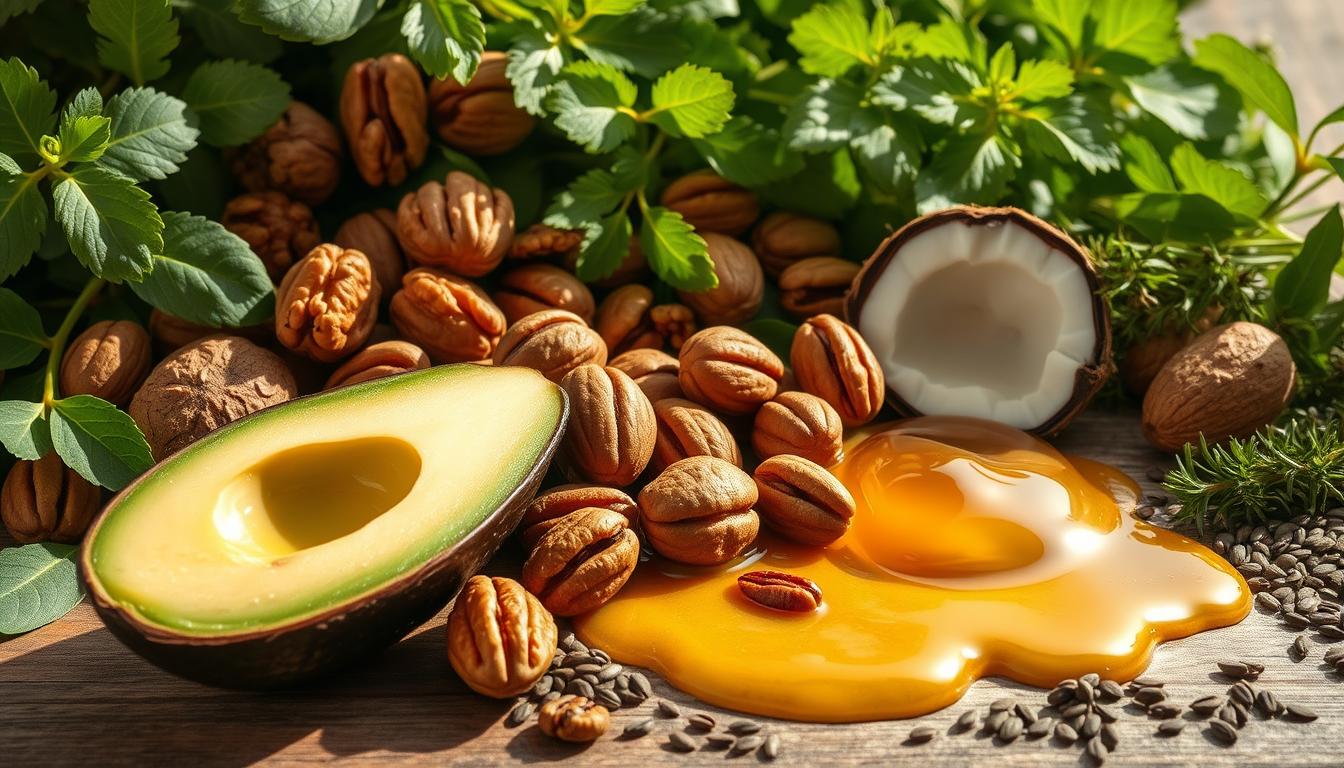Did you know 70% of your brain is made of fat? This surprising fact highlights why the right dietary choices matter for mental sharpness. Research confirms that certain fats, like those in olive oil and nuts, play a crucial role in memory and focus.
For decades, low-fat diets dominated nutrition advice. Yet, studies now reveal that healthy fats support cognitive function. Diets like the Mediterranean and MIND emphasize these nutrients, linking them to lower dementia risks.
Liz Weinandy, a registered dietitian, stresses long-term eating patterns over quick fixes. Consistent intake of whole foods, rich in essential fatty acids, offers lasting benefits. Your diet today shapes your brain’s future.
Key Takeaways
- Your brain consists of 60-70% fat, requiring quality dietary sources.
- Mediterranean and MIND diets are linked to better cognitive health.
- Olive oil and nuts provide fats that enhance memory.
- Long-term dietary habits outweigh short-term “superfood” trends.
- Ohio State University research connects diet to blood sugar and dementia risks.
The Science Behind Fats and Brain Health
Not all fats are created equal—some fuel your mind, while others harm it. Neurons rely on fatty acids to build cell membranes and transmit signals. Without the right types, your memory, focus, and mood can suffer.

Why Your Brain Needs Healthy Fats
Docosahexaenoic acid (DHA), an omega-3, makes up 30% of brain matter. It strengthens neuron structure and is vital for learning. Pregnant women need DHA for fetal brain development.
Top food sources include:
- Wild salmon (EPA/DHA)
- Chia seeds (ALA, a plant-based omega-3)
- Walnuts and flaxseeds
The Risks of Unhealthy Fats
Harvard research found replacing margarine with olive oil cuts dementia risk by 28%. Unlike processed fats, olive oil’s chemical structure protects cells.
| Fat Type | Source | Impact |
|---|---|---|
| Healthy | Olive oil, fish, nuts | Boosts brain function, reduces Alzheimer’s disease risk |
| Unhealthy | Margarine, fried foods | Contains trans fats that damage cells |
Watch for hidden fats like mono-/diglycerides in packaged snacks. These mimic saturated fat and spike inflammation.
The Role of Butter and Other Healthy Fats in Brain Power
Your diet directly impacts mental clarity and long-term cognitive health. Certain fats stand out for their ability to nourish neurons and protect against decline. Research highlights olive oil, omega-3s, and even coconut oil as key players.

Olive Oil: A Mediterranean Secret for Cognitive Longevity
A 2023 Harvard study found that consuming over 0.5 tablespoons of olive oil daily reduces dementia mortality by 28%. Extra virgin olive oil (EVOO) contains polyphenols that cross the blood-brain barrier, shielding cells from damage.
Store olive oil in a cool, dark place to prevent oxidation. Pair it with leafy greens for maximum absorption of fat-soluble vitamins.
Omega-3s (Fish, Nuts, Seeds): The Brain’s Building Blocks
Docosahexaenoic acid (DHA) from fatty fish like salmon boosts memory and learning. Plant-based sources like walnuts provide ALA, but conversion rates to DHA are low—only 5-10%.
- Prioritize wild-caught fish for EPA/DHA
- Combine flaxseeds with vitamin C-rich fruits to enhance absorption
Coconut Oil: Controversial but Potentially Beneficial
Lauric acid in coconut oil produces ketones, an alternative energy source for the brain. Rush University’s 3-year trial noted cognitive improvements in participants using it moderately.
Balance is key—overuse may raise LDL cholesterol. Learn more about its effects in our detailed analysis.
Butter: Moderation Is Key
Ohio State University recommends limiting saturated fats like butter to 10% of daily calories. Small amounts can fit into a brain-healthy diet when paired with omega-3s and vegetables.
How to Incorporate Brain-Boosting Fats Into Your Diet
Swapping just one ingredient could slash dementia risk by 14%. Start with simple upgrades in your kitchen to fuel focus and long-term cognitive health. Here’s how to make every meal work for your mind.
Simple Swaps for Everyday Cooking
Replace margarine with olive oil—studies link this switch to an 8–14% lower dementia risk. Use coconut oil for baking instead of shortening. Its lauric acid supports ketone production, an alternative brain fuel.
For salads, skip commercial dressings. Whisk olive oil with lemon juice and herbs. This avoids oxidized fats found in processed mayo.
Meal Ideas Rich in Healthy Fats
Try sardine salad with cherry tomatoes and EVOO. Fatty fish provides DHA, while olive oil enhances vitamin absorption. For breakfast, chia pudding with almond milk offers plant-based omega-3s.
Pair roasted vegetables with quinoa. Fiber-rich whole grains feed gut bacteria linked to brain health. Need more ideas? Explore these smoothie recipes with flaxseed.
Foods to Avoid for Optimal Brain Health
Fried foods contain damaged fats that spike inflammation. Processed meats like hot dogs often include nitrates, harming blood flow to the brain.
- Swap deli meats for grilled chicken or chickpeas.
- Choose air-popped popcorn over chips.
- Opt for dark chocolate (>70% cacao) instead of candy bars.
Ohio State suggests batch-cooking with affordable staples like beans and frozen veggies. This balances cost and cognitive benefits.
Conclusion
Cognitive decline isn’t inevitable—your plate holds the key. Since 70% of your brain is fat, quality sources like olive oil and nuts fuel its function. A Mediterranean diet isn’t a quick fix; Rush University found lifelong habits outshine short-term changes.
As researcher Tessier notes, “Olive oil… may reduce risk of fatal dementia.” Start small: swap processed fats for whole foods. Audit your meals—does your diet prioritize brain health?
Your choices today shape tomorrow’s clarity. Every bite counts.